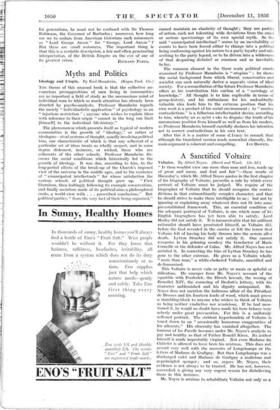Myths and Politics
Ideology and Utopia. By Karl Mannheim. (Kogan Paul. 15s.) THE theme of this unusual book is that the collective un-
„ _ conscious presuppositions of men liNing in communities are as important a field of study as the unconscious mind of individual man to which so much attention has already been directed by psycho-analysts. Professor Mannheim regards the merely "individualistic application” of psychology as an "injurious restriction " ; anyone who wishes to explain ideas with reference to their origin "cannot in the long run limit [himself] to the individual life-history."
The phenomenon which presents itself as typical of modem communities is the growth of "ideology," or rather of ideologies—rival systems of thought, usually involving political bias, one characteristic of which is that any adherent of a particular set of ideas treats as wholly suspect, and in some degree dishonest, insincere, or wicked, those who are adherents of the other schools. Professor Mannheim dis- cusses the social conditions which historically led to the growth of ideology. It was due, according to him, to the long-period effects of the break-up of the Church's imposed view of the universe in the middle ages, and to the existence of "emancipated intellectuals" for whose satisfaction the various schools of political thought grew up. "First liberalism, then haltingly following its example conservatism, and finally socialism made of its political aims a philosophical credo, a world-view with . . . prescribed conclusions." But political parties, "from the very fact of their being organised," cannot maintain an elasticity of thought ; they are patties of action, each not tolerating wide deviations from the creed or serious questionings of its_ own special myth. So the
said "emancipated intellectual" seems by an inevitability of events to have been forced either to -change into a political
being conforming against his nature to a party loyalty and sub- scribing to the party legend; or to be driven into a wilderness of that despairing disbelief so common and go inevitable today.
The common element in the three main political creeds examined by Professor Mannheim is " utopian " ; he shows the social background fr6m which libeial, conservative and socialist can each naturally derive a separate vision of ideal society. For a reconciliation of the future Professor Mannheim offers as his contribution this outline of a "sociology of knowledge." All thought is to him explicable iii terms of group-history, and his enthusiasm for his undoubtedly valuable idea leads him to the extreme position that his own work is a product of his social environment ; to "resolve contradictions" is a fallacious intellectualist device, according to him, whereby an es: ayist s:•.eks to disguise the truth of his unconscious position from himself as well as from his readers, so Professor Mannheim himself carefully declares his intention not to correct contradictions in his own text.
After this it is a matter of some d1/411cacy to remark that although the translated version reads somewhat clumsily, the
main argument is coherent and compelling. IAN BOWEN.
















































 Previous page
Previous page